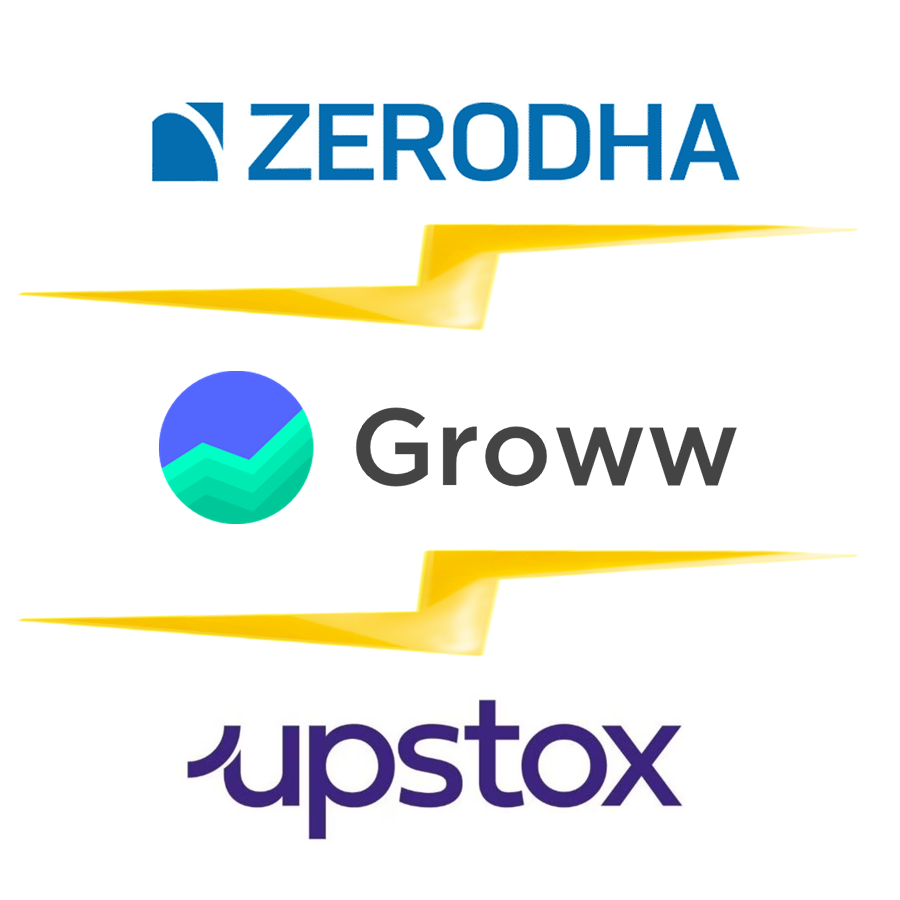The financial markets in India have undergone significant transformation since the introduction of digital trading platforms. Prominent entities that have gained recognition for their contribution include Zerodha, Groww, and Upstox. These platforms have not only made stock market access more democratic but have also fundamentally changed the way individuals invest and trade. This article examines the business models of these industry leaders to understand their growth strategies, assets, and future potential. We will dive deeper into comparing Zerodha vs Groww vs Upstox by providing a more detailed analysis of their respective technological advancements, business models, and prospects.
Zerodha vs Groww vs Upstox: A Detailed Comparison of Account Opening Charges, Brokerage Plans, and Features
Zerodha: Revolutionizing Indian Stock Trading
In 2010, the Kamath brothers founded Zerodha to make stock trading more accessible to the people of India. They challenged the traditional commission-based model by introducing a revolutionary idea of 0% brokerage fees. Zerodha’s unique approach involved implementing a fixed fee structure and offering advanced trading features such as Varsity and Coin, which attracted traders of all skill levels. This innovative methodology significantly reduced costs for traders and provided them with extensive access to educational materials and investment opportunities.
Business Model Analysis
Key Partnerships: Crucial collaborations with depositories, banks, and stock exchanges ensure regulatory compliance and seamless transactions.
Key Activities: Core activities include continuous platform development, market research, customer support, and regulatory compliance.
Essential Resources: Zerodha’s intellectual capital in market analysis, product innovation, technological infrastructure, and human capital are the company’s critical resources.
Value Proposition: Zerodha’s fundamental value proposition centres around its direct mutual fund platform, Coin, Varsity’s educational resources, and fixed fee structure.
Customer Relationships: The company has built strong relationships with its consumers by strategically utilising digital channels, offering personalised support, and providing educational content.
Channels: Zerodha’s outreach is broadened through its investments in partnerships with fintech influencers, online platforms, mobile applications, and social media.
Customer Segments: Zerodha caters to many clients, from beginners to experienced traders and investors.
Cost Structure: The company’s costs are attributed to various factors, such as marketing expenses, technology maintenance, regulatory compliance, and employee salaries.
Revenue Streams: Zerodha generates revenue mainly from its premium services, including coins, brokerage fees, and interest earned on client funds held in their accounts.
Competitive Edge and Market Impact
Zerodha has become a leader in the Indian brokerage industry by prioritising user experience and education and implementing a disruptive pricing model. The company has attracted millions of users by offering innovative platforms like Kite and Coin, which have challenged established competitors and set new benchmarks for affordability and transparency.
Groww: Empowering Millennial Investors
Groww is a platform simplifying the investment process for millennials and novice investors. It was established in 2016 by former employees of Flipkart. The platform offers an intuitive mobile application and user-friendly interface, focusing on mutual funds and equities. This makes it an ideal investment alternative for a generation that values transparency and easy accessibility. Groww has successfully communicated complex financial concepts, delivered informative materials, and ensured a smooth investment journey for its users.
Business Model Analysis
Key Partnerships: Strategic alliances are vital for strengthening the investment ecosystem. Collaborations with financial institutions, regulatory agencies, and asset management firms can provide support.
Key Activities: Some core activities for investment platforms include product development, customer support, market analysis, regulatory compliance, and customer education.
Essential Resources: Groww is a strong player in the investment market thanks to its partnerships, technically proficient staff, and data analytics capabilities.
Value Proposition: For novice investors, Groww offers attractive features such as easy-to-use platforms, transparency, simplicity, and no commissions on mutual funds.
Customer Relationships: To build strong customer relationships, it is essential to offer educational content, personalised recommendations, and responsive customer support.
Channels: To engage and acquire customers, companies can use various marketing channels, such as content marketing, social media, mobile applications, and partnerships with influencers.
Customer Segments: This company targets millennials and first-time investors looking for easy, hassle-free investment options.
Cost Structure: The company’s cost structure includes expenses related to marketing, technology infrastructure, regulatory compliance, and talent acquisition.
Revenue Streams: The company’s revenue mainly comes from commissions on mutual funds, premium services, and interest earned on client funds.
Market Positioning and Future Growth
The audience that Groww is targeting has responded positively to the company’s strategic focus on education, transparency, and simplicity. The increasing range of products offered by Groww and its rapid acquisition of users indicate a promising future for the company as it develops new strategies and secures a larger share of the retail investment market.
Upstox: Innovating Affordable Trading Solutions
Upstox, known as RKSV Securities, was established in 2012 to make trading more accessible and affordable. Its focus on technology, low-cost business models, and advanced trading platforms like Upstox Pro has generated much interest among active traders and investors. With its competitive pricing, solid technological infrastructure, and unwavering commitment to customer satisfaction, Upstox has become a significant player in the Indian trading industry.
Business Model Analysis
Key Partnerships: Collaborating with regulatory bodies, technology providers, stock exchanges, and clearing corporations is crucial to ensure operational efficiency.
Key Activities: Upstox’s core activities include developing the platform, conducting market research, providing customer support, complying with regulations, and managing risks.
Essential Resources: Upstox’s critical resources include its technology infrastructure, risk management systems, talented professionals, and industry expertise.
Value Proposition: Active traders find Upstox attractive due to its low-cost trading, sophisticated trading platforms, margin trading facilities, and customer-centric services.
Customer Relationships: To foster robust customer relationships, Upstox implements strategies such as personalised support, trading education, community forums, and market insights.
Channels: The company acquires new customers through various means, including digital marketing channels, online platforms, referral programs, and partnerships with financial influencers.
Customer Segments: The customer segments are designed to attract tech-savvy individuals seeking cost-effective trading solutions, active traders, and investors.
Cost Structure: The organisation’s expense structure includes several components, including technology maintenance, risk management, marketing expenses, regulatory compliance, and talent acquisition.
Revenue Streams: The primary sources of revenue for the company come from brokerage fees, margin interests, premium services, and client fund interest.
Market Dynamics and Future Strategies
Upstox has become a significant player in India’s highly competitive trading market by effectively blending technology, affordability, and customer-centricity. To stay ahead of the curve in this ever-evolving industry, the company must prioritise innovation, product expansion, and improving user experience, as these factors are crucial for maintaining growth momentum.
Conclusion: Dynamics of Competition and Future Trends
The trading platform sector in India is multifaceted and innovative, as demonstrated by the presence of Zerodha, Groww, and Upstox. Each platform has unique advantages, serving specific consumer segments and driving market development. Groww prioritises simplicity and education, while Zerodha focuses on affordability and advanced tools. Upstox, on the other hand, offers cost-effective trading solutions supported by state-of-the-art technology.
As technology advances, regulations change, and consumer preferences shift, the competitive landscape will inevitably evolve. These platforms must innovate their products and services, adapt to these changes, and maintain a customer-centric approach to thrive and lead the next phase of expansion in India’s digital trading ecosystem.
Zerodha vs Groww vs Upstox: Pros and Cons Analysis of India’s Top Trading Platforms
Account Opening Charges and AMC
Zerodha: No account opening charges. AMC for Demat account: ₹300/year.
Groww: No account opening charges. No AMC for the Demat account.
Upstox: There are no account opening charges for a limited time. The regular AMC for a Demat account ₹150/year.
About Brokerage Plans
Zerodha: Offers a flat fee brokerage model: ₹20 per trade or 0.03% of turnover, whichever is lower.
Groww: There is zero brokerage for mutual funds. For stocks, brokerage is zero, but taxes and other charges apply.
Upstox: Offers different brokerage plans, including a flat fee and subscription-based model (Upstox PRO).
Account Opening Request
Zerodha: Online account opening process through their website or mobile app.
Groww: Online account opening process through their mobile app.
Upstox: Online account opening process through their website or mobile app.
Account Opening Process
Zerodha: Offers an online account opening process through their website or mobile app.
Groww: Offers an online account opening process through their mobile app.
Upstox: Offers an online account opening process through their website or mobile app.
Brokerage Charges
Zerodha: Charges a flat fee brokerage of ₹20 per trade or 0.03% of turnover, whichever is lower.
Groww: Charges zero brokerage for mutual funds, while for stocks, brokerage is zero, but taxes and other charges apply.
Upstox: Offers different brokerage plans, including flat fee brokerage and a subscription-based model (Upstox PRO).
Share Broker’s Transaction Charge
Zerodha: Charges ₹325 per crore for Equity Delivery and ₹325 per crore for Equity Intraday, Futures, and Options.
Groww: Vary based on the exchange and transaction type.
Upstox: Vary based on the exchange and transaction type.
Account Features
Zerodha: Offers advanced trading platforms, research tools, mutual fund investments, and a Coin platform for direct mutual funds.
Groww: This platform provides a simple and user-friendly interface, mutual fund investments, IPO investments, and thematic investment options.
Upstox: Provides high-speed trading platforms, technical analysis tools, mutual fund investments, and a margin trading facility.
Trading Platform
Zerodha: Kite platform for trading, Coin platform for mutual fund investments.
Groww: Mobile app for trading and investment.
Upstox: Upstox is a pro trading platform with a mobile app for trading.
Broker Ratings by Users
Zerodha: Highly rated for its low-cost brokerage, advanced tools, and customer support.
Groww: Well-rated for its user-friendly interface, zero brokerage for mutual funds, and educational content.
Upstox: Generally positive ratings for its low-cost trading, advanced platforms, and margin trading facility.
Investment Offerings
Zerodha: Stocks, mutual funds, ETFs, IPO investments, bonds.
Groww: Stocks, mutual funds, ETFs, IPO investments, gold.
Upstox: Stocks, mutual funds, ETFs, IPO investments, bonds, commodity trading.
Order Types
Zerodha: Regular order types like market order, limit order, stop-loss order, etc.
Groww: Market order, limit order.
Upstox: Market order, limit order, stop-loss order, bracket order, cover order.
Customer Service Offered
Zerodha: Email support, phone support, chat support, knowledge base.
Groww: Email support, in-app chat support, knowledge base.
Upstox: Email support, phone support, chat support, knowledge base.
Demat Account
Zerodha: Offers Demat account services.
Groww: Offers Demat account services.
Upstox: Offers Demat account services.
Special Offers, Advantages, Disadvantages
Zerodha: Offers educational resources, low-cost brokerage, and advanced tools. However, it may occasionally experience platform downtime.
Groww: Zero brokerage for mutual funds, user-friendly interface. However, it offers limited stock research tools.
Upstox offers low-cost trading, advanced platforms, and a margin trading facility. However, it may occasionally experience technical glitches.



